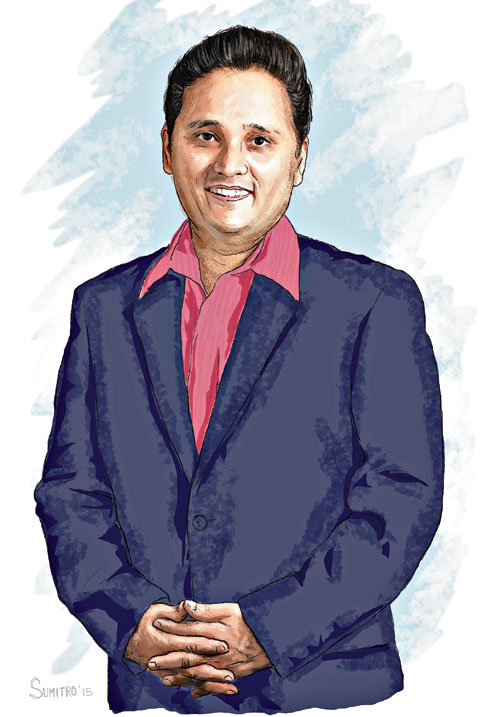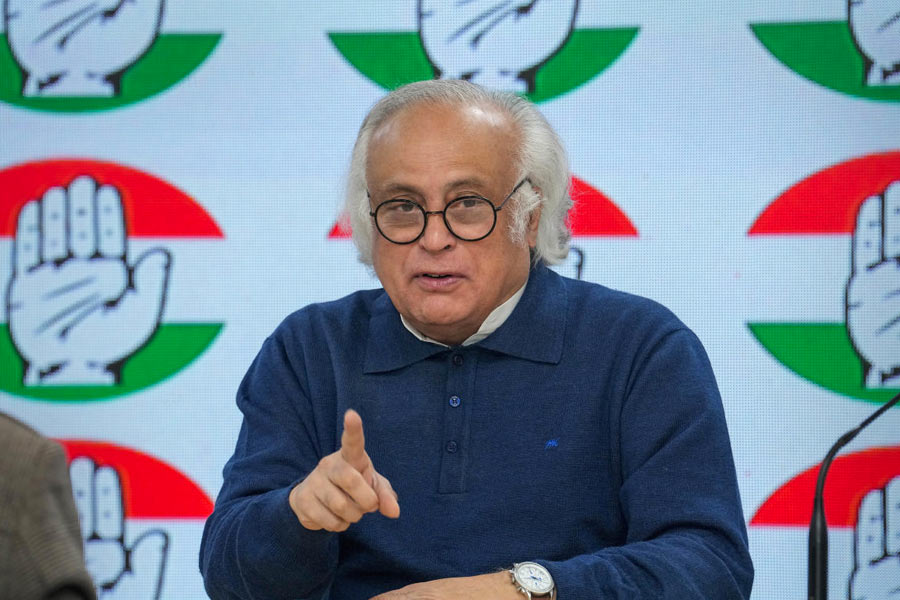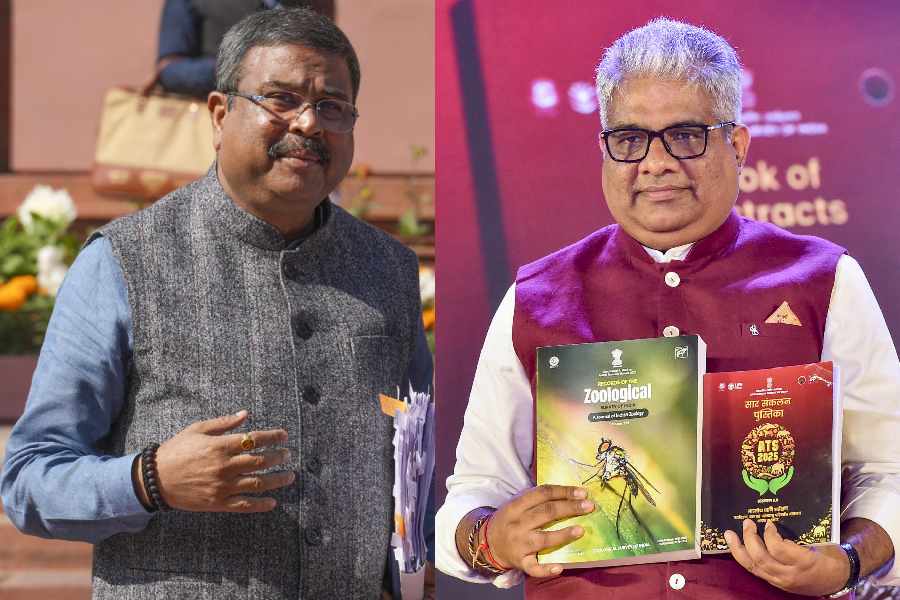
If he weren't a bestselling writer, Amish Tripathi could have written a handbook on how to be one. Indeed, Amish (he doesn't like to use his caste surname, because he does not believe in caste) seems to have cracked the code to becoming a writing phenom in today's India. His Shiva trilogy - where Shiva (yes, THE Shiva) is this cool dude who takes a drag from his chillum and exclaims "bloody hell" now and then even as he goes about delivering the world from evil - has sold 2.2 million copies. The first book of his breathlessly awaited next series, The Scion of Ikshvaku, based on the Ramayana story, will be out this June. You can bet your bottom rupee that the print order for that is nothing short of gargantuan. But Amish declines to say exactly how much. "My publisher and I agreed that it would be arrogant to reveal the figure," he smiles a bit sheepishly.
I meet Amish at the Mumbai Cricket Association Club in the city's booming Bandra Kurla Complex. It's a new club with a studied, old world feel about it - all deep leather sofas, tables with antique chess sets, dark wood panelling and glossy wooden flooring. "The older clubs wouldn't take me, yaar," Amish says, laughing. "Nor would I want to be a member there. Some of them are totally racist. I remember we had gone to Breach Candy once with our kid and the maid. They wouldn't let the maid in! So we walked out."
Indeed, though he may be given to quoting from the Gita and the Upanishads, the 40-year-old banker-turned-author comes across as a thoroughly regular guy. As we talk - over green tea and a plate of hummus and pita bread - he also comes across as a fiercely proud Indian, and one who probably never experiences the slightest tinge of doubt about his dearly held convictions.
His conviction regarding his work proved spot on, of course. The Immortals of Meluha, the first book of the Shiva Trilogy, was rejected by umpteen publishers. "I stopped counting after 20," he grins. But he went ahead and self-published it, marketed it himself with some pretty nifty strategems, and before he knew it, the book was a bestseller.
He didn't quit his job till his second book too had become a smash hit. And till the royalty cheques got bigger than his salary, he informs me with a chuckle. But how did he find the time to write while he was in a stressful corporate job, I ask him.
"You can always find time if you want to. You just have to stop wasting time, watching TV, going out, partying. For those five-six years I just did my job, spent time with my family, and I wrote," says Amish, who confesses to be an out-and-out family guy. "Whatever partying- wartying I do, I do with my family," he says.
In the beginning, however, the book was just a labour of love. He did not expect to get it published. "I did not expect anything," he says. "In a way, I was beginning to practise Gita's doctrine " Karmanye vadhikaraste/ Ma phaleshu kadachana (You have the right to your work, not to the fruits of it)." And when he wanted to make his book see the light of day, and publishers spurned him, that too did not get him down. He was disappointed all right, but he just went on working.
Interestingly, Amish feels that writing the book has transformed him. "I was rude, arrogant, hyper competitive - an absolute SOB," he says. "I always thought my cabin should be bigger, I should have got a bigger bonus, etc. Writing the book changed me as a person. I'm much calmer. It's a 180 degree shift, yaar. I have found meaning in my life. I have found balance."
It's also made him religious. He believes that he owes the books - and their success - to Lord Shiva's blessings and he is now an ardent worshipper of the blue-throated god.
Amish didn't set out to be a writer. A mathematics major from St. Xavier's College, Mumbai, and an MBA from IIM, Calcutta, he admits freely that he was never particularly creative. "I was totally a left brain guy," he says. But then, around 2004, while he was busy advancing himself in a lucrative banking career, he felt the urge to write a philosophical treatise on "what is evil?". His wife and family told him that though his idea sounded interesting, it would be better to explore it through a story. And so it turned into an adventure tale riding on the back of his understanding of the Upanishads and Puranas.
Mythology was his natural métier - because he knew it well. His grandfather was a pandit in Benaras and both his parents are deeply religious. "It happens to be an area where I have knowledge," he says.
It is also an area he is passionate about. In fact, he is passionate not just about Hindu mythology, but ancient Indian culture as a whole, and he can talk at length about how rich and liberal it was. "Do you know, as many as 30 hymns in the Rig Veda were written by women rishis? But they don't teach you these things in our schools," he exclaims with disgust. "Our entire education system is based on the assumption that we were a bunch of barbarians before the British came and civilised us! People can name the theatre where Shakespeare performed his plays, but they can't name five plays by Kalidasa. I am not anti-West, but we must be rooted in our own culture."
That's my cue to ask him about his views on the recent controversy over the assertion by some Hindu nationalists that ancient Indians knew all about aerodynamics, plastic surgery and so on. This is a very important subject, Amish replies seriously. "Unfortunately, it has got stuck between two groups of idiotic extremists. One believes Indians invented everything, and the other, the left wing, believes that we were barbarians. The truth lies somewhere in between. For instance, it's entirely credible that Acharya Baudhayana came up with Pythagoras' theorem before the Greek mathematician did. It's there in the Shulva Sutras (a text attributed to the sage)."
In truth, it's not just the wonders of ancient India that animate him. A voracious reader - he reads six to eight books a month, he says - he is keenly interested in all ancient cultures such as Greek, Egyptian, Mesopotamian, Chinese and so on. There are about 25 books in his head, he says, and some of them extend to these ancient cultures and their myths.
Will he ever write anything other than mythology?
"I don't know. Right now I have enough to keep me busy for the next 30 years! Of course, if my next book flops, I will go back to banking," he laughs.
There's little chance of that happening. A formidable marketing machinery to launch The Scion of Ikshvaku has already kicked in. The book cover was recently released by actor Akshay Kumar amid much fanfare. Amish is always personally involved in the marketing of his books. "I'm a bit of a control freak," he says. "When I write, I am a complete loner. But when it's time to sell the book, I'm a hard core marketing and sales guy. I prepare a strategy document. After all, we live in an over-communicated world, where people are constantly distracted - by TV, mobile, Facebook, Twitter... you have to get your message across effectively."
That's why he feels it was a blessing in disguise that his first book didn't find a publisher - because a traditional publisher would never have gone for the out-of-the-box methods he used to sell his books. These included, famously, distributing free first chapters of his book at stores and uploading a cinematic trailer on YouTube. He was the first author who made PowerPoint presentations at bookstores, and they were so gobsmacked that they readily displayed his teaser chapters. Customers picked them up. And then came back for the book.
"Don't get me wrong, the people in the publishing industry are really sweet. But they don't know anything about marketing books," Amish says, smiling. "Wine and cheese book launches don't sell books."
Since self-publishing is so easy now, thanks to the Internet, are the days of traditional publishing numbered?
Not so, says Amish. "India is a big country. A mainstream publisher helps with its distribution network. Which is why I too transferred to a mainstream publisher.
"But I don't understand this tendency to look down upon self-published authors," he continues. "I see self-publishing as a freedom of expression issue. Publishers have the right not to back your book with their money. You have a right to make yourself heard. Calling it 'vanity publishing' is nonsense."
Amish is not just a role model for every wannabe bestselling writer - he could also teach you how to tackle criticism. Indeed, despite the huge popularity of his books, critics haven't always been kind to him. But he takes that with his usual pragmatism. "Frankly, critics don't impact the sales of books nowadays," he says sharply. "I read reviews to see if I can learn anything from them. But if they're merely saying my English is not good enough, then they don't matter. I write in Indian English - for Indians. I don't write British English."
In fact, Amish will tell you calmly that language and writing style don't really matter. He dismisses the importance of plot or characterisation with equal asperity. "For me, the core of a book is its philosophy. If a book has no philosophy, it's a body without soul. Take P.G. Wodehouse. It's good. But it's not what you would call high quality. It's not that you're learning anything."
The Wodehouse fan girl in me could have argued that one till the cows came home. But our time is up and we come out of the club. A black Mercedes E220 sails up. And Amish climbs into it and rides away, his mind perhaps already busy hatching yet another heroic, teeming, action-packed tale of a man who would be god.










